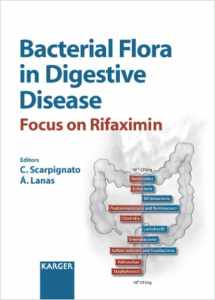
Bacterial Flora in Digestive Disease: Focus on Rifaximin
Book details
Summary
Description
Reprint of: Digestion 2006, Vol. 73, Suppl. 1 Hundreds of bacterial species make up human gut flora. The intestine has at least 400 different species of bacteria totaling over 1012 organisms. Of these, 99% are anaerobic bacteria. The gastrointestinal tract is then exposed to countless numbers of bacterial species and foreign antigens and has embedded a unique and complex network of immunological and non-immunological mechanisms to protect the host from potentially harmful pathogens. Healthy individuals are generally tolerant to their own microbiota, but such tolerance is impaired in patients with both organic and functional gastrointestinal diseases. The advancement of the knowledge on microbial-gut interactions in health and disease has allowed a more pathophysiologically-oriented approach to several challenging clinical conditions. There are currently two ways to manipulate enteric flora. Antibiotics can selectively decrease tissue invasion and eliminate aggressive bacterial species or globally decrease luminal and mucosal bacterial concentrations, depending on their spectrum of activity. Alternatively, administration of beneficial bacterial species (probiotics), poorly absorbed dietary oligosaccharides (prebiotics), or combined probiotics and prebiotics (synbiotics) can restore a predominance of beneficial commensal flora. These two therapeutic approaches are not, of course, mutually exclusive. Rifaximin, a poorly absorbed antibiotic targeted at the gastrointestinal tract, has been long used in Italy for the treatment of infectious diarrhea in both adults and children. During the past few years the appreciation of the pathogenic role of gut bacteria in several organic and functional gastrointestinal diseases has increasingly broadened its clinical use, which now covers hepatic encephalopathy, small intestine bacterial overgrowth, inflammatory bowel disease and colonic diverticular disease. Other potential clinical indications are being explored and look promising. In this issue, leading scientists (both Spanish and Italian) discuss - in a series of state-of-the-art reviews - the current status of the present knowledge on Microbial Flora in Digestive Diseases and assess the role of rifaximin in several gut-related organic and functional gastrointestinal disorders. Since it includes much information difficult to collect from other scattered sources, this volume will be of interest to infectiologists, gastroenterologists and digestive surgeons alike.


We would LOVE it if you could help us and other readers by reviewing the book
Book review



